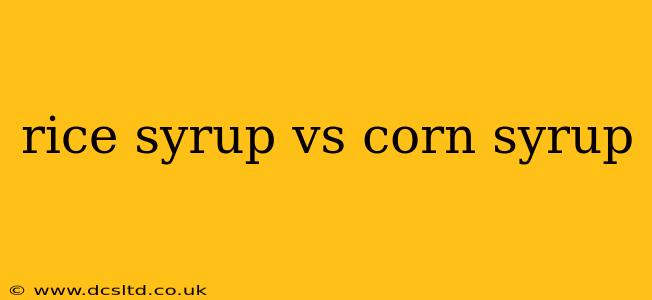Choosing between sweeteners can be a minefield, especially with so many options boasting "natural" or "healthy" claims. Today, we're diving deep into the comparison of rice syrup and corn syrup, exploring their origins, nutritional profiles, and potential uses to help you make informed decisions for your culinary creations and overall health.
What is Rice Syrup?
Rice syrup is a sweetener produced from the enzymatic hydrolysis of rice starch. Essentially, enzymes break down the starch into simpler sugars, primarily glucose and maltose. This process results in a syrupy liquid with a mild sweetness and slightly thinner consistency compared to corn syrup. It's often marketed as a healthier alternative to corn syrup, particularly by those following gluten-free diets. However, let's delve deeper into the nuances of each sweetener to fully assess that claim.
What is Corn Syrup?
Corn syrup, on the other hand, is derived from corn starch through a similar enzymatic process. The resulting syrup is predominantly glucose, offering a noticeably sweeter taste than rice syrup. There are different types of corn syrup, including high-fructose corn syrup (HFCS), which undergoes further processing to increase its fructose content. HFCS has been a subject of considerable debate due to its potential health implications.
Rice Syrup vs. Corn Syrup: Nutritional Differences
Let's analyze the nutritional composition of these two sweeteners:
| Nutrient | Rice Syrup (approx. per 100g) | Corn Syrup (approx. per 100g) |
|---|---|---|
| Calories | 300-350 | ~380 |
| Carbohydrates | 75-85g | ~95g |
| Sugar | High (primarily glucose & maltose) | High (primarily glucose) |
| Protein | Trace | Trace |
| Fat | Trace | Trace |
| Fiber | Minimal | Minimal |
| Glycemic Index | Moderate to High | High |
Important Note: Nutritional values can vary depending on the specific brand and processing methods. Always check the individual product label for accurate information.
Is Rice Syrup Healthier Than Corn Syrup?
While rice syrup might seem healthier due to its association with rice, a whole grain, this is a simplification. Both sweeteners are primarily composed of simple sugars, offering minimal nutritional value beyond calories. While rice syrup may have a slightly lower glycemic index (GI) than some corn syrups, meaning it causes a slower rise in blood sugar, this difference is often not significant enough to justify a definitive "healthier" label. The overall impact on blood sugar depends on the amount consumed and individual metabolic factors.
Furthermore, the processing involved in creating both rice and corn syrups can remove many of the potential nutritional benefits associated with their respective base ingredients.
What are the Different Types of Corn Syrup?
There's a significant distinction between regular corn syrup and high-fructose corn syrup (HFCS).
- Regular Corn Syrup: Primarily glucose.
- High-Fructose Corn Syrup (HFCS): Undergoes additional processing to convert some of the glucose into fructose, resulting in a sweeter taste. This is the type of corn syrup that has drawn the most criticism regarding health effects.
How are Rice Syrup and Corn Syrup Used in Cooking?
Both rice syrup and corn syrup are versatile sweeteners used in various applications:
- Baking: Adding moisture and sweetness to baked goods.
- Candy Making: Contributing to texture and sweetness in candies.
- Sauces and Glazes: Providing sweetness and body to sauces and glazes.
However, the subtle differences in flavor and consistency might necessitate adjustments in recipes when substituting one for the other. Rice syrup's milder sweetness might require a slightly larger quantity to achieve the desired sweetness level compared to corn syrup.
Is Rice Syrup Gluten-Free?
Yes, rice syrup is naturally gluten-free, making it a suitable sweetener for individuals with celiac disease or gluten sensitivity.
Conclusion: Making Informed Choices
Ultimately, the choice between rice syrup and corn syrup is a matter of personal preference, dietary needs, and health goals. While rice syrup is often marketed as a healthier option, both are primarily composed of simple sugars and offer minimal nutritional value. Moderation is key when consuming either sweetener, and choosing less processed, whole-food sources of sweetness whenever possible is generally recommended for optimal health. If you have specific dietary concerns or health conditions, consulting a registered dietitian or healthcare professional is always advisable.
